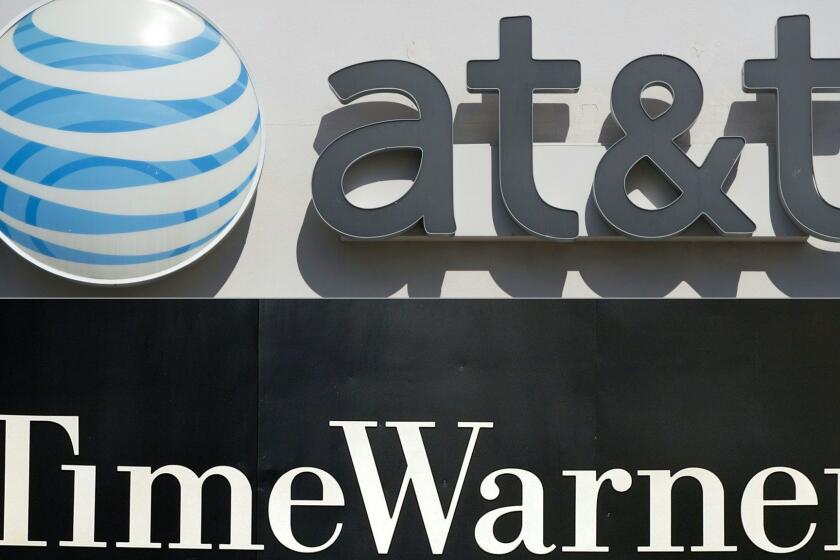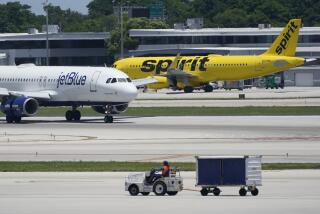Column: With its Sprint merger in the bag, T-Mobile is already backing away from its promises

The wireless companies T-Mobile and Sprint promised regulators essentially that nirvana awaited society if they could only win approval of their $31-billion merger deal.
Some of the promises have been nebulous: “T-Mobile and Sprint are coming together to build the best wireless company around,” the “new” T-Mobile says.
Some have been more specific but not immediately relevant: T-Mobile says that over the next six years it will build out a higher-capacity faster 5G, or fifth generation, wireless network (though you’ll need a 5G phone to use it).
We try to create conditions to make sure that consumers are not being left behind in the rush for the companies to satisfy their shareholders. Then they get what they want and try to change the rules.
— Christine Mailloux, Turn
And some were imposed by regulators, including maintaining jobs and making network improvements.
T-Mobile and Sprint completed their merger April 1. And now — no surprise to the deal’s opponents — the merged company is already reneging on some of these conditions.
Most recently T-Mobile has moved to overturn several conditions imposed by the California Public Utilities Commission, including at least one the company specifically promised California Atty. Gen. Xavier Becerra in settling Becerra’s lawsuit to block the merger.
In a June 23 motion, T-Mobile is asking for two extra years to roll out high-speed 5G service across California. It’s also trying to nullify a PUC order that it add at least 1,000 new jobs in California payroll within three years, over and above the combined headcount of Sprint and T-Mobile when the merger closed.
In the aftermath of a federal judge’s approval Tuesday of the mega-merger between AT&T and Time Warner, you’ll be reading about how this deal will vastly remake the entertainment and information landscape, most likely at consumers’ expense.
The company says that it “stands by all of its commitments” to state and federal regulators. But it also stands by its position that the PUC has “no legal authority to require approval for a wireless merger” — and especially no authority to dictate its employment levels, a position with which the commission, obviously, disagrees.
“The PUC has broad authority over T-Mobile and it should continue to hold the company accountable,” says Ana Maria Johnson, program manager for communications policy at the Public Advocates Office, an independent body within the PUC charged with protecting utility customers’ interests.
“The company’s continuing actions to undermine that oversight just shows that it doesn’t have the public interest in mind,” Johnson adds. The public interest, she says, plainly includes issues such as employment.
T-Mobile also is trying out a position that has already become common in corporate America and is destined to become more so: It implies it needs to back away from its promises because of the coronavirus.
(We earlier reported on the effort by the giant Sutter Health hospital chain to renege on terms of an antitrust settlement it reached in December with Becerra.)
Giant Sutter Health says coronavirus crisis warrants renegotiating antitrust settlement. Don’t believe it
To consumer advocates, this all comes out of the big company merger playbook.
“We try to create conditions to make sure that consumers are not being left behind in the rush for the companies to satisfy their shareholders,” says Christine Mailloux, who participated in the PUC review of the merger as an attorney for the consumer organization Turn. “Then they get what they want and try to change the rules. That’s what’s happening here.”
Mega-mergers are invariably described by their promoters as heralds of a new age for customers.
In 2011, for instance, what was then the biggest merger in the information and entertainment sectors — Comcast’s $30-billion takeover of NBCUniversal — was pitched as bringing such benefits to the public as improved cable TV and internet technology, more innovative TV programming and lower prices.
Similar claims have been made for all the media mega-mergers of the last two decades, involving Walt Disney Co., ABC, Viacom, CBS, Time, Warner Bros., CNN and AOL, among other companies. None of these promises has come about. Yet the deals have rolled across the landscape like juggernauts.
The marriage of T-Mobile and Sprint was crucial for the future of wireless communications in the U.S. because it involved reducing the number of major wireless carriers from four to three: Verizon, AT&T and T-Mobile.
The deal was bound to do “irreparable damage to competition in the wireless market and the low-income customer markets,” the Public Advocates Office warned in its opposition brief in January 2019. That would mean higher prices for customers and an “absence of specific, measurable, and verifiable benefits attributable to the merger.”
The merger seemed to proceed along a well-greased path. The Department of Justice and Federal Communications Commission both approved the deal in 2019, albeit with modest conditions including the sale of Sprint’s prepaid wireless business — chiefly Boost Mobile — to Dish Network.
A lawsuit to block the merger filed last June by the District of Columbia and 13 states, including California and New York, was thrown out by U.S. District Judge Victor Marrero of New York in February.
What we can learn from a close look at Comcast’s troubling past
Marrero seemed wearied and exasperated by the burden of choosing between “competing crystal balls” foretelling what would happen if the merger were to go through — the companies predicting a boon for consumers, the opponents predicting higher prices and crummier service.
In his decision, he accepted T-Mobile at its own level of self-esteem. He labeled the company an “undeniably successful … maverick that has spurred the two largest players in its industry [that is, Verizon and AT&T] to make numerous pro-consumer changes,” and waved the deal through.
That left California to carry the regulatory ball. Becerra approved the deal March 11 as part of a settlement of the state’s lawsuit to which T-Mobile agreed.
Yet the merger raised regulatory issues in California the moment it was completed April 1. That’s because the PUC hadn’t yet given its approval to merge the companies’ California operations.
Commissioner Clifford Rechtschaffen, who oversaw the PUC’s consideration of the merger, ordered the companies on April 1 not to do so until the PUC could issue its final decision. They bulldozed ahead with the national merger. T-Mobile says it agreed to not integrate T-Mobile and Sprint operations in California pending the PUC decision, which ultimately came April 16.
“We have the utmost respect for the CPUC,” T-Mobile spokeswoman Tara Darrow told me by email. But actions speak louder than words, and this action hardly bodes well for the “new” T-Mobile’s willingness to comply with any of its legal obligations.
The company says “we are seeking changes in the CPUC conditions to align them with our commitments.” A strong regulator, however, would instruct a company to align its commitments to the regulator’s conditions, not the other way around.
Let’s take a look at the PUC’s conditions, and the company’s reaction to them.
Say this for Politico and the daily Playbook emails it blasts out to a large circle of Washington opinion makers and their ilk: They make it easy to keep track of the latest lobbying balderdash put out by big corporations.
Start with the requirement that T-Mobile increase its net full-time employment in California by 1,000 jobs within three years of the merger closing. That mandate “exceeds the PUC’s authority,” Darrow said.
In any event, the company says in its motion that the mandate is “particularly burdensome and unjustified in light of the current COVID-19 crisis.” It doesn’t say why that would be so, other than mentioning “the major consequences” the crisis has had on the economy thus far and could have on T-Mobile in the future.
The company also says it stands by its commitment to be “jobs positive” in California, meaning it will maintain employment at least at the combined pre-merger levels.
There are a couple of problems with this position. One is that it made the same 1,000-job promise to Becerra — specifically, that it would open a customer service center in Kingsburg, a Fresno suburb, with 1,000 new jobs — in the lawsuit settlement it entered into voluntarily. (T-Mobile maintains the Kingsburg commitment is separate from the pledge to maintain employment at least at pre-merger levels.)
Second, in PUC testimony in January 2019, then-T-Mobile COO G. Michael Sievert, now the CEO of the merged company, truculently insisted that the company was committed to increased hiring.
Responding to a Communications Workers of America union warning that T-Mobile would try to cut staff after the merger, he said “the CWA is just dead wrong” and its claim “defies credulity.” He pointed to internal projections that employment would be 11,060 higher by 2024. “The merger will … be job positive on Day One,” he said.
As it happens, on June 16 T-Mobile told hundreds of Sprint employees that they would be losing their jobs in August.
The second major change T-Mobile is seeking from the PUC involves the commission’s mandate that it provide 5G network speeds of 300 megabits per second to 93% of the California population by year-end 2024.
From the day in 2016 when AT&T announced its $85.4-billion merger with Time Warner, through three years of antitrust wrangling over the deal, the big telecommunications company promised that it would mean lower prices and more choices for consumers.
This condition reflected T-Mobile’s own projection of the pace of the rollout, Mailloux says. But T-Mobile now claims it didn’t mean 2024 — it just used that date as a “proxy” to signify a point six years after the merger closed — and since the merger closed in 2020, the condition should now read “2026.” The company says meeting the earlier deadline isn’t “feasible.”
Is that so? Mailloux recalls that company officials were “crowing — crowing — about how this merger would enable them to build a stronger, faster, better network in a blazing time frame. Now, after they get their approval, they’re saying, that’s not what we meant.”
In flouting the PUC’s authority, T-Mobile may be playing the fait accompli card that has helped many other merged companies suffer only slap-on-the-wrist penalties for breaking pre-approval conditions. Its merger is sealed; and it‘s unlikely that any regulator has the power or the gumption to force it to be unwound, no matter how many commitments the company breaches.
Indeed, one point that Turn, the Public Advocate and other consumer groups have made is that the PUC’s enforcement options are essentially toothless. Practically speaking, the most the commission can do is levy financial penalties for breaches.
The consumer groups noted in a filing in May that the PUC’s approval of the deal “fails to define the penalties or to create a citation program that will impose penalties in proportion to the hundreds of millions of dollars at stake in this merger.”
They asked for a further hearing to shore up the enforcement mechanism and strengthen the PUC conditions, but T-Mobile has opposed the motion and the PUC hasn’t ruled on it.
Californians, therefore, will have to rely on the Public Utilities Commission showing sufficient spine to hold T-Mobile to its conditions and slap it hard in the pocketbook for any breach. It can start with fining the company for flouting its own order to delay the merger.
T-Mobile showed itself to be a scofflaw on Day One. Will that be the last time? Don’t bet on it.









